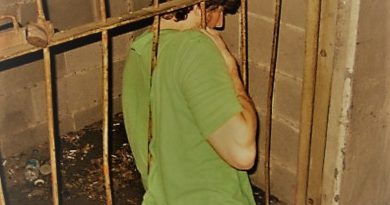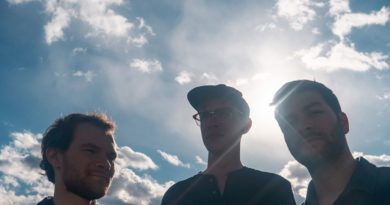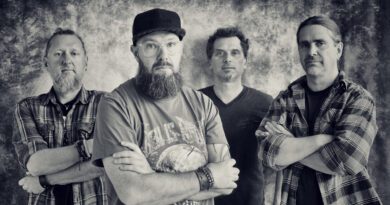A Chat with Zoé Basha (23.05.25)
French-American musician, composer, and carpenter Zoé Basha’s new album, Gamble, is an evocative and genre-blurring journey through identity, grief, and the beauty of human connection. Merging genres of folk, blues, Americana, jazz, and Irish traditional, the songstress carries the listener through these tales with the warmth of a friend and the edge of truth. We caught up with Zoé Basha to discuss all things music below.
OSR: Gamble feels like a deeply personal album. Can you tell us what inspired the themes of love, loss, and resilience that run throughout the record?
Basha: Ah, life. It throws you shit, and with it, one must make cake, eh? Songwriting that’s personal, as it is on this album, exists as a way of processing complex emotions and as a cathartic release following struggle. A lot of the inspiration stemmed from intimate relationships – their evolution, the patterns, their births, their deaths, the chaos between. Some of these were romantic, some familial, and some with my own darn self. As the songs are a collection written over a decade, they represent various different periods for me, with contrasting needs, desires, and questions. Without getting into the nitty gritty of each story (from both the original songs and the traditionals, and what they reference), the collection uses personal experience to reflect on universal struggles to which most of us can relate somewhere along the way.
OSR: You’ve spent a lot of time busking on the streets of Europe. How has that experience shaped the way you approach songwriting and performance?
Basha: I started busking as a teen in Miami, and it was the way I made money for years while traveling. As a performer, it was hugely effective in building my confidence, and as a vocalist, it helped loads in honing my technique for projection. Some songs like ‘Traveling Shoes’ developed their style through busking. Others were more written for myself, lying on sitting room floors, warmed by my own sounds and the quiet fire of a wood stove.
OSR: The album blends such a wide range of genres – folk, blues, jazz, and Irish traditional music. How did you decide to combine these influences in Gamble?
Basha: Well, it was less of a decision and more of an organic outcome. Outside of my massive appreciation and love for these styles of music, they’re intricately linked to each other. Although I’m sure ChatGPT has clear distinctions – haha – I often have a hard time differentiating between folk, blues, jazz and traditional music. Blues is folk music, my favourite kind of jazz is early traditional jazz that mixes with country and blues, and traditional music falls under the umbrella of folk. I love the sassy, crunchy colours of jazz and blues, and having listened to and studied jazz blues music, it’s deeply embedded in how I approach music in general, both subconsciously and intentionally. Folk music/traditional music is music that belongs to everyone, both in its stories, its oral tradition, the mystery of its composers, and its shared ownership. This reflects anarcho-communist values that are central to my approach to life itself, as well as music.
OSR: ‘Traveling Shoes’ is one of the standout tracks on the album. Can you share the story behind this song and what it represents to you?
Basha: I started writing this song when I was 18. I was just discovering polyamory at the time, and just starting to travel. My focus was flighty exploration – I felt a strong pull to follow my impulsive desires, and avoid being held down by anything. It was my approach to love, and it was the only thing that made sense at that time. Loving hard, and letting go easily.
OSR: Your voice has been compared to classic jazz singers like Billie Holiday. Do you feel any particular connection to that era of music, or is it more of a stylistic influence?
Basha: Definitely both. It’s easy to romanticize times past, and choose to see only the appealing aspects of it. As someone who’s critical of technology, industrial capitalism, and consumerism, the first half of the 20th century seems pretty dreamy in loads of ways… It also meant a hell of a lot more struggle for women and queer folks and people of color. But where there is struggle, there is resistance. Women of jazz are a symbol of that. In a hugely male-dominated field, they paved their way and had to fight to maintain what control they could of their own careers. In jazz blues, musicians like Memphis Minnie and Sippie Wallace were hugely influential women of color making their mark as both vocalists and instrumentalists. And then jazz vocalists like Billie Holiday and Ella Fitzgerald were central in the development of my vocal expression and technique.
OSR: How did you go about choosing which traditional songs to include in Gamble? Was there a specific reason behind your choices like ‘Three Little Babes’ or ‘One Morning In May’?
Basha: Each of the traditional songs, beyond being strong, stand-alone, emotive songs with impactful stories that belong to everyone, has personal significance for me. They represent specific times of my life, which intertwine with the stories sung. ‘One Morning in May’ is a song narrated by a woman reflecting on a life of suffering as a result of the oppression of women. I learned this song over a decade ago and sang it around bonfires, kitchen tables, and shows in a squatted anarchist social centre in Dublin that we called ‘the Barricade Inn.’ Years later, we arranged it into three-part harmonies with vocal trio Rufous Nightjar – and the song now carries a blend of its own story with the nostalgia of mine.
OSR: You produced Gamble yourself. What was that process like for you? How did you balance creative control with getting the right sound and feel for the album?
Basha: Although I produced it myself, it wouldn’t be what it is without all the input and effort from the insanely skilled musicians and the recording and mixing engineers. I had reference albums and tracks that gave a feel for what I was going for, but I also knew what I wanted for the album as its own individual piece of work. I learned a lot about the recording process and production in general with this album – especially through asking shitloads of questions along the way – and I’m looking forward to doing more of it.
OSR: You mentioned that you didn’t think music was useful for the world at one point. What changed your perspective, and what was it like returning to songwriting after that break?
Basha: I was working as a traditional timber framer in France for a few years, but when vocal harmony trio Rufous Nightjar started with Branwen Kavanagh and Anna-Mieke Bishop, I was coming back to Ireland more and more often for residencies and recording and tours. It started to make sense then, music. As in, focusing on music professionally started to seem like something that was actually in reach, and it could take multiple forms.
OSR: Who were some of your biggest musical influences while creating this album, and how did they shape the sound of Gamble?
Basha: Bonnie Raitt has been influential to me since I was in my early teens. The early blues sound with real tasty keys playing and a clear voice is some of the most gorgeous stuff I seek out. I’m actually going to see her live for the first time next month, in Dublin.
This last year, I’d been listening to a lot of Steve Miller Band (as always), Billie Holiday, Gina Leslie, Hohnen Ford, and Anna Mieke. I’m pretty heavy on the older stuff from the 30s, the 60s and 70s, and then peers, or similar-type, smaller-scale independent folk artists of today.
OSR: What do you hope listeners will take away from Gamble? Is there a particular emotion or message you want them to connect with when they hear the album?
Basha: I hope the songs make folks feel things, and deeply. The best songs do just that. Beyond that, I hope they encourage people to keep digging, deconstructing, and questioning ourselves, those around us, behavioural patterns, embedded systems of oppression, and all that jazz.
Many thanks to Zoé Basha for speaking with us. Find out more about Zoé Basha on her official website, Instagram, and Spotify.


